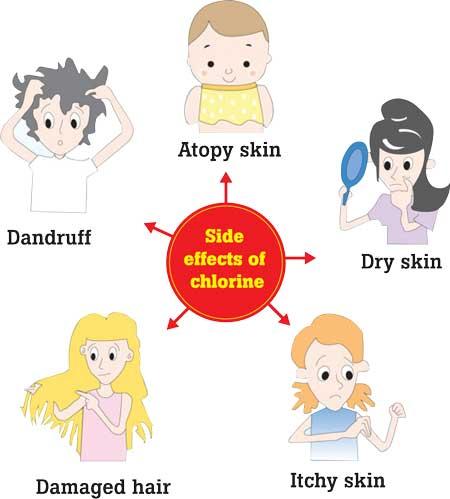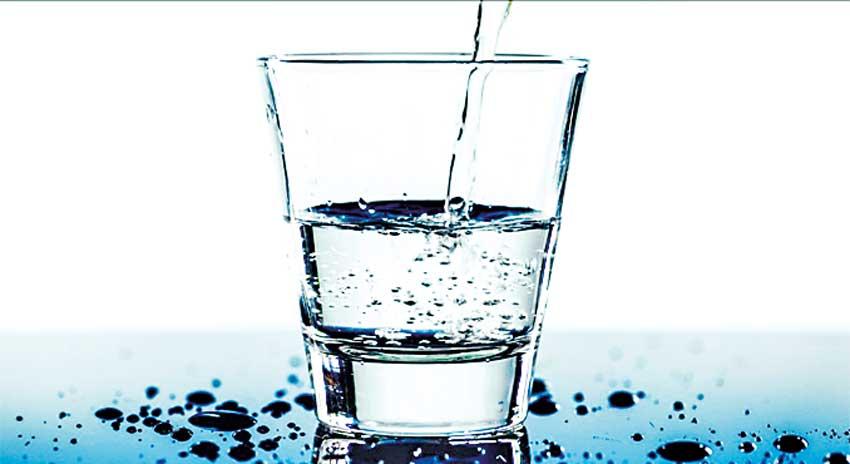
Water is a natural resource which is essential for the existence of life. These days people consume more water due constant thirst and dry weather. Most of us believe that plenty of water consumption may help to maintain voice, health and beauty. There is a recommended amount of water that needs to be consumed daily. The quality of drinking water is vital for humans since it is directly linked to our health. According to WHO, nearly 80% of all the diseases in human beings are caused by water. Among contaminations, chemical contaminants of drinking water is regular and frequent than microbial contaminants. This is because adverse health effects occur from chemical contaminants. These diseases are generally associated with long-term exposure to chemical contaminants. Therefore, this week’s health capsule segment is going to focus on the drawbacks of over consumption of chlorinated water and how it would effect on our health.
Chlorine has multiple uses as it is used in the purification of drinking water as a disinfectant. It is also used as bleach. The most harmful way of getting exposed to chlorine is inhalation of this gas or if it comes in direct contact with the skin and the eye or through ingestion of food and chlorine-containing water.
There are benefits of chlorine use in the sterilization. This prevents the spread of epidemics and also reacts with organic matter found in water such as decaying tree residues and animal material which produce substances known as chlorinated hydrocarbons. However, chlorine has been helpful in the development of other diseases due to over consumption or long-term exposure to it.
Moreover, according to the research studies, the exposure to chlorine increases when swimming in chlorinated water. This is because when the temperature of the water is 30°C and it increases the proportion of chloroform to 0.2mg, but if it rose to 40°C, the concentration goes up to 7mg, resulting in a lack of blood flow in the capillaries near the skin. This happens in order to spread the blood across large distances through which it reaches the bloodstream. Furthermore, inhalation of chlorine vapor during bathing increases the problems associated with asthma and allergies. Short-term exposure to these conditions can cause eyesore, cough, sputum and chest, nose pain.
Adverse effects
- Respiratory system

When exposed to a high concentration of chlorine can lead to the accumulation of fluid in the lung and swelling, and also lead to bronchitis and even death due to difficulties in breathing. It is the occurrence of irritation and inflammation of the nose and throat membranes and inflammation of the respiratory tract. Chronic symptoms due to frequent exposure to low levels of chlorine especially by workers who work in institutions producing chlorine-containing bleach, drinking water purification and sewage, may include symptoms of bronchitis and asthma. As mentioned in the research studies, people who always expose themselves to chlorine may become more susceptible to Tuberculosis though, chlorine-based sterilizers, which include chlorine, hypochlorite. The research study found that swimming in chlorinated water pools for a longtime leads to changes in the respiratory system like that it happens in connection with asthma.
The chlorine reaction with the mucous membrane of the cornea is highly acidic, but the proteins’ presence in tears protect by reducing the damage of these acids, which cause burns in the membranes of the corneal epithelium. This condition can heal with time. Burns that occur in the centre of the cornea may lead to an ulcer and then leave a scar inside.
Bathing and ablution with chlorinated water causes scalp and skin redness. This happens mainly in people who are most susceptible to allergies. Chlorine is found to be associated with destroying of hair proteins. As a result of that hair becomes dryness, fragile and lose color. And also it increases dandruff. Research studies have shown that swimming in chlorinated pools lead to the absorption of chlorine by the skin within 10 minutes. There are eight cups of chlorine in the water making the skin dry and itchy. Swimming in a chlorinated pool can dry out the skin and make it tight and irritated on the grounds. Individuals with delicate skin may even get aggravation or a rash from the pool’s drying impacts. In some situations, chlorine can be the cause for worsening of skin conditions like dermatitis. Moreover, long-term impacts of drinking, washing and swimming in chlorinated water appears to cause dangerous melanoma skin cancer.
As studies indicate, the continued contact with chlorinated water, by drinking water or swimming in it, can cause tooth decay and weakness due to hydrochloric acid formed as a result of the chlorine reaction with the moisture in the mouth besides inflammation of the lining of the mouth. In a case reported in Cuba depicts the relative total loss of enamel by corrosive disintegration, especially from the front teeth, in a lady who swam daily for about fourteen days in an inappropriately chlorinated swimming pool in Cuba.
Exposure to chlorine by swallowing and dealing with chlorine-containing detergents at home leads to vomiting and chest pain. Prolonged exposure leads to irritation of the pharynx, esophagus, and liver and intestinal tissue. Several studies revealed that the drinking of water containing chlorine derivatives such as chloroform is a carcinogenic agent. Several studies indicated that there is an increase of 15-35% in cancer among people who use chlorinated water compared to other cases associated with non-chlorinated water; where the presence of correlation between bladder and rectum cancer with consumption of chlorinated water is noted. Moreover, few studies indicated the presence of positive correlation between colon, stomach, pancreas, liver, bladder and anal cancer and the exposure to chlorinated byproducts in drinking water.
Chlorine is one of the oxidizing substances that reduces the level of oxygen in the cells, increasing the risk of heart disease. It has been shown that chlorinated water has an effect on the heart and blood circulation system, which is discovered by using bird studies where they were treated with chlorinated water compared to the group that took chlorine free water.
Studies have stated that chlorine reacts with a naturally occurring organic matter, during the production of drinking water and leads to the formation of disinfection by-products which causes adverse reproductive effect such as intrauterine growth retardation, low birth weight and spontaneous abortion. A cross-sectional study indicates an increase in the birth defect such as Cleft palate Anencephalus (baby is born without part of brain and skull) and ventricular septal defects risk (defect in the wall dividing the left and right ventricles of the heart) from prenatal exposure to disinfection byproducts in drinking water. It is found that women who drink chlorinated water increase the chance of miscarriage; hence the dead fetuses and also the increase in the number of birth defects where the babies suffer from heart problems, cleft palate and brain abnormalities. Here chlorine is one of the important factors that contribute to the increase of breast cancer across the world.
Chlorine is an important water disinfector due to it decreases the pathogens in the water. However, there is a recommended dose of chlorine by WHO and over that limit and frequent exposure to minute concentration of chlorine will be toxic to us and its participant in the deficiency of immunity, cancer and Abnormalities. It is necessary to look for less hazardous and less harmful substances as a substitute for chlorine or chemical disinfection. Moreover, we can remove or reduce the chlorine content in chlorinated water by using specific filter system and boiling.
The writer is a medical laboratory technologist at a private hospital and holds a MSc. Degree in Industrial and Environmental Chemistry from the University of Kelaniya and a BSc in Food Production and a Technology Management degree from the Wayamba University.

 Water is a natural resource which is essential for the existence of life. These days people consume more water due constant thirst and dry weather. Most of us believe that plenty of water consumption may help to maintain voice, health and beauty. There is a recommended amount of water that needs to be consumed daily. The quality of drinking water is vital for humans since it is directly linked to our health. According to WHO, nearly 80% of all the diseases in human beings are caused by water. Among contaminations, chemical contaminants of drinking water is regular and frequent than microbial contaminants. This is because adverse health effects occur from chemical contaminants. These diseases are generally associated with long-term exposure to chemical contaminants. Therefore, this week’s health capsule segment is going to focus on the drawbacks of over consumption of chlorinated water and how it would effect on our health.
Water is a natural resource which is essential for the existence of life. These days people consume more water due constant thirst and dry weather. Most of us believe that plenty of water consumption may help to maintain voice, health and beauty. There is a recommended amount of water that needs to be consumed daily. The quality of drinking water is vital for humans since it is directly linked to our health. According to WHO, nearly 80% of all the diseases in human beings are caused by water. Among contaminations, chemical contaminants of drinking water is regular and frequent than microbial contaminants. This is because adverse health effects occur from chemical contaminants. These diseases are generally associated with long-term exposure to chemical contaminants. Therefore, this week’s health capsule segment is going to focus on the drawbacks of over consumption of chlorinated water and how it would effect on our health. 
